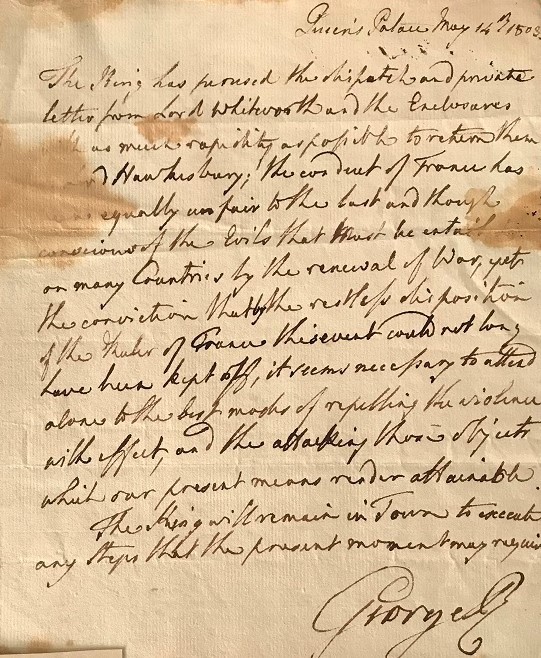On 10 January 2019, a handwritten letter penned on 14 May 1803 by King George III addressed to the British Secretary of State Lord Hawkesbury in which he intended to declare war on Napoleon was bought by a private collector for more than £11,000 at auction, more than 11 times its upper estimate of £1,000.
Transcript of the letter written just four days before the Napoleonic Wars officially began [on the 18 May 1803]:
‘The King has perused the dispatch and private letter from Lord Whitworth and the Enclosures with as much rapidity as possible to return them to Lord Hawkesbury; the conduct of France has been equally unfair to the last and though conscious of the Evils that must be entailed on many Countries by the renewal of War, yet the conviction that by the restless disposition of the Ruler of France this event could not long have been kept off, it seems necessary to attend alone to the best modes of repelling the violence with effect, and the attacking those objects which our present means render attainable. The King will remain in Town to execute any Steps that the present moment may require.
[signed] George R.’.
The previous owner had aquired the letter in 1966 for £55. The letter was first sold in 1935 at Maggs Rare Books and Map Sellers for £38.
According to Charles Ashton, Director of the Cambridge auction house Cheffins (UK): “This letter is a defining moment of history showing the King’s intention to go to war with France and Napoleon. The Napoleonic wars are iconic of the huge victories of the British army and these were defining moments in our country’s history, laying the groundwork for the nation to rule the waves and put us at the forefront of European history. Whilst relations between Britain and France had been somewhat strained since the Treaty of Amiens in March 1802, this letter marks the end of peacetime negotiations and contains the explicit instructions from the King to proceed with war. The war was formally declared four days later and was one of the most iconic periods in European history, seeing the battles of Trafalgar and Waterloo and eventually the overthrowing of Napoleon. Lord Whitworth was a British politician and diplomat and at the time of the letter was ambassador in Paris. Lord Whitworth was a key player in the final declaration of war with France. In February 1803, Napoleon Bonaparte is said to have threatened Lord Whitworth with war if Malta was not evacuated. Whitworth was ordered to withdraw from Paris on 10th May 1803 if the French did not accede to British demands and he eventually left France on the 13th May. Documents signed by George III come up fairly often at auction, however, letters fully written by the King are infinitely more rare. […] The letter is unusual in that it is written by the King himself, as opposed to have been dictated to a scribe and then countersigned. […]”
Sources:
http://www.cheffins.co.uk/en/news/library-sale-preview-january-2019
https://www.bbc.com/news/uk-england-cambridgeshire-46825053


